Herb Wounded Head, Brooking, SD
Warm-up Question
Were you ever in or have you seen a natural disaster (fire, flood, hurricane, tornado)? Describe the experience.
Down from the Mountain
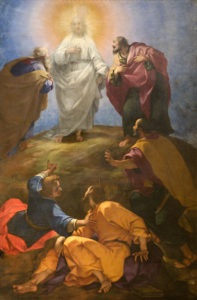
Perhaps you have heard about the Dakota Access Pipeline (DAPL) project and subsequent protests. There’s plenty of controversy surrounding DAPL and plenty of questions surrounding what’s happening in North Dakota near the Standing Rock Reservation. People have come from around the globe to protest or support the project. Many people think that the Native leaders from the Standing Rock had plenty of time to respond to the proposal. Others have said that only certain people had been approached and that the informational meetings were not made widely available to the tribal members. Proponents believe the pipeline is necessary and a safer way to transport oil than additional trucks on the road.
Arguments against the DAPL include protecting clean water, respecting tribal sovereignty, and even protecting the creation as a whole. But did you know that the very first protest of the DAPL was from a group of High School students? Standing Rock youth launched a petition called Rezpect our Water, and in mid-July set out on a 500-mile relay run to Washington, DC to deliver a petition of 160,000 signatures. http://billmoyers.com/story/need-know-dakota-access-pipeline-protest/
This isn’t the first time that the Standing Rock and Cheyenne River tribal peoples have had disagreements with the government over land and water rights. In 1944, Congress approved the Pick-Sloan Plan for flood control and navigation of the Missouri River, which cuts through the heart of North and South Dakota. The plan involved the construction of four dams, which impacted twenty-three Native reservations. As a result, one thousand Native families were forcibly displaced. Many Native leaders charged that the project selected Native lands rather than non-Native lands while also ignoring tribal sovereignty, Indian law and treaty rights.
https://en.wikipedia.org/wiki/Pick%E2%80%93Sloan_Missouri_Basin_Program
This is a complex story which began long before the current controversy. Natives have had difficulty dealing with government entities since before the days of colonization in the United States. When we come with much baggage and hard feelings, working together can be impossible. It’s almost as if the two parties have such a scarred relationship that they are unwilling to listen to one another’s needs and wants, let alone be able to work together.
Discussion Questions
- What do you think about the Dakota Access Pipeline? What are some of the larger issues at play?
- Have you ever had troubling coming to an agreement with someone in a group project? How did you resolve that issue?
- What sort of baggage are you carrying that you need to recognize?
Transfiguration of Our Lord
Exodus 24:12-18
2 Peter 1:16-21
Matthew 17:1-9
(Text links are to Oremus Bible Browser. Oremus Bible Browser is not affiliated with or supported by the Evangelical Lutheran Church in America. You can find the calendar of readings for Year B at Lectionary Readings
For lectionary humor and insight, check the weekly comic Agnus Day.
Gospel Reflection
The Gospel reading from this week is commonly called “The Transfiguration.” It can be a confusing text to read, because we simply don’t have a way to easily describe what’s going on here. The text is pretty clear, but what actually happens and what it means is kind of confusing. Matthew writes, “Jesus was transfigured before them, and his face shone like the sun, and his clothes became dazzling white.” That’s pretty remarkable. Jesus’ true heavenly self is revealed, and he is not alone; Elijah and Moses are there as well.
I would think that if I saw something like that, it would leave me speechless. It’s almost like Peter, James and John are seeing something like a natural disaster. Our first response to such a sight is shock and awe.
One person, is so moved by this awesome experience that he wants to spend time in the moment. Peter proposes that they build tents, or places to stay, there on the mountain for all three people—Jesus, Moses and Elijah. Seems like a smart thing to do. Stay put in this heavenly, awesome moment and soak it all in.
But then a voice interrupts Peter and makes the proclamation of who Jesus really is. “This is my beloved Son, with whom I am well pleased. Listen to Him.”
This is an important moment in the Gospel of Matthew, and it echoes back to similar elements from Jesus’ baptism. A voice from the heavens says pretty much the same thing, “This is my son, the beloved, with whom I am well pleased.” This transfiguring moment makes the connection between the Old Testament prophets, and who Jesus is. Jesus further develops what God has done in the stories of Israel.
Jesus continues to show the world is doing in and among the people that he loves. Jesus is and will continue to be the fulfillment of the hope for redemption for the people of Israel and the whole world. A big moment indeed, but that means there is work to be done. Jesus and his disciples cannot stay on the mountain. They must come down, even to work among and with the people who are beginning to not like this Jesus and what he is about. But now, these three disciples know that Jesus is the Son of God, and as Jesus’ disciples, they must answer the calling to continue to do the work of God, even if it means doing things that they do not wish to do, like come down from the mountain.
Discussion Questions
- When have you experienced an awe inspiring moment? When have you experienced something that took your breath away? Where were you?
- Studies on the brain have shown that awe-inspiring moments are spiritual experiences which, if repeated, make it easier for us to think and work with our thinking brain. Do you think there are ways to cultivate awesome experiences? If so, how might you do that?
Activity Suggestions
For this activity, you will need a gym-type ball (a mid-sized dodgeball works best, but a basketball or volleyball will do) and a space large enough to do a relay race without running into any obstacles. Divide your group into two teams and have each team member find a partner. The object of this game is to carry the ball from one end of the space to another while holding the ball with only your foreheads. Once one team finishes, they pass the ball to the next pair, continuing on until everyone is finished. If you’d like an extra challenge, if time allows, you can also carry the ball only using your back (no locking arms!)
- What was it like carrying the ball that way? What gave you the most success?
- How can this activity help our day-to-day lives?
- Who do you need to listen to and work with this next week?
Closing Prayer
God of reconciliation and hope, you inspire us each and every day to see the world as you see it, as a place bursting with love, and care for each other and creation. Inspire us to come down from our mountains of isolation into the midst of your world’s greatest needs to be the voice of those we can’t hear, and the hands of those who need your compassion. In the name of our revealed Lord and Savior, Amen.
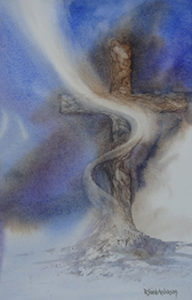


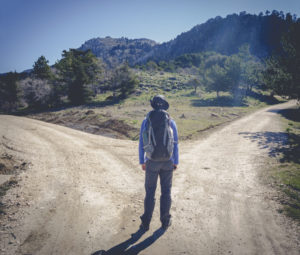
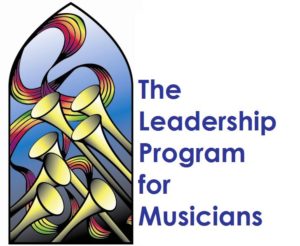
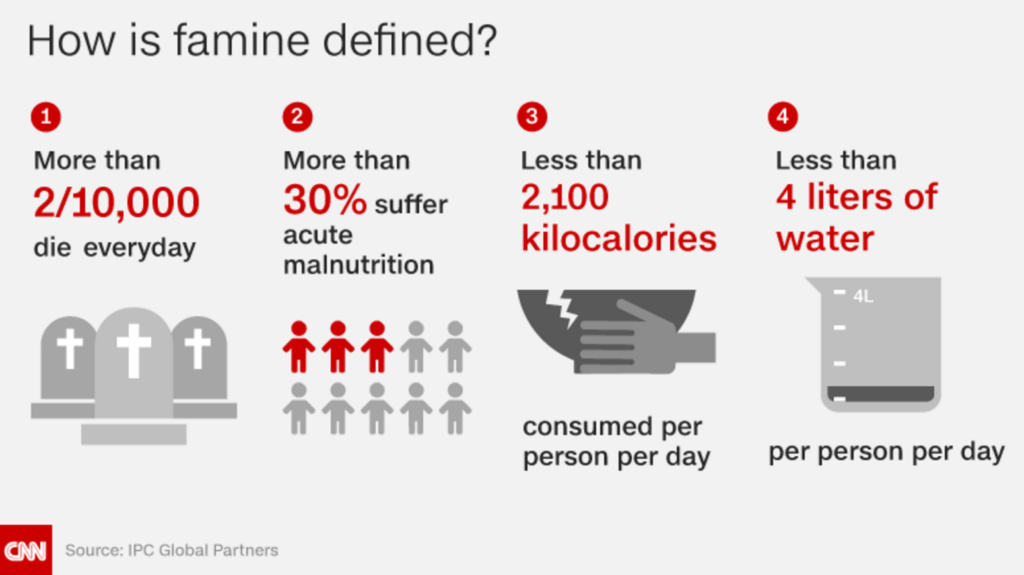
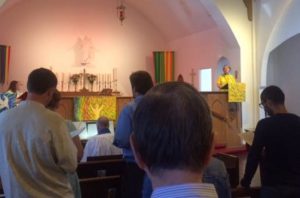

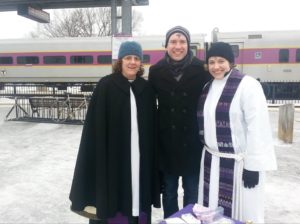
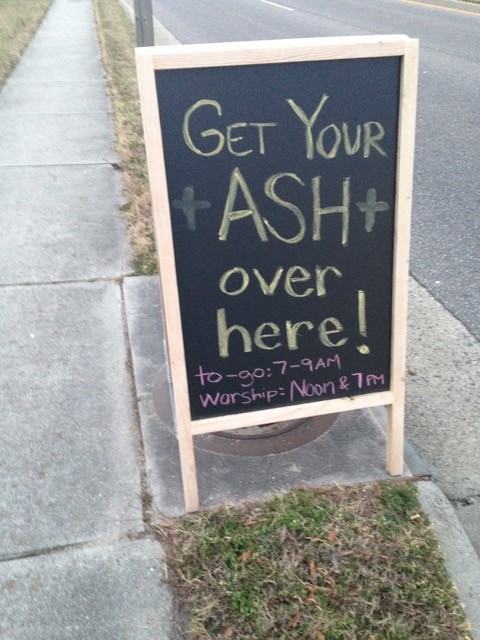 In 2016, after moving back to Virginia, sunrise on Ash Wednesday was warmer (not that my Southern blood allowed me to really appreciate it). The congregation I serve in Chesapeake, Virginia does not have a centralized gathering spot for commuters, so I simply stood outside the church, again with my little table, ashes, hand warmers, and sign. Some parishioners stood with me to pray with those who stopped by, and more stopped since they would not be able to make either of our worship services that day.
In 2016, after moving back to Virginia, sunrise on Ash Wednesday was warmer (not that my Southern blood allowed me to really appreciate it). The congregation I serve in Chesapeake, Virginia does not have a centralized gathering spot for commuters, so I simply stood outside the church, again with my little table, ashes, hand warmers, and sign. Some parishioners stood with me to pray with those who stopped by, and more stopped since they would not be able to make either of our worship services that day.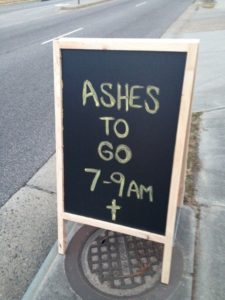
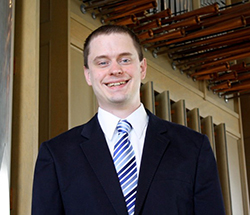 On Feb. 19, many congregations will sing “Oh, Praise the Gracious Power” (Evangelical Lutheran Worship, #651) in response to the readings from Paul about Christ as our foundation (
On Feb. 19, many congregations will sing “Oh, Praise the Gracious Power” (Evangelical Lutheran Worship, #651) in response to the readings from Paul about Christ as our foundation (
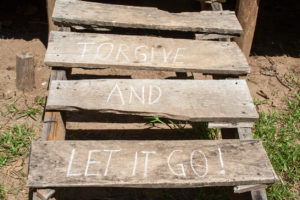
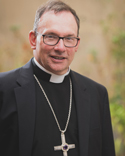 The year after I graduated from college I had a Fulbright Fellowship to study in France. I was a student that year at the Faculty of Protestant Theology of the University of Strasbourg. Far away from home, I spent the year in classes with people who knew they wanted to be Lutheran pastors. Over the course of that time I realized I wanted to be one as well.
The year after I graduated from college I had a Fulbright Fellowship to study in France. I was a student that year at the Faculty of Protestant Theology of the University of Strasbourg. Far away from home, I spent the year in classes with people who knew they wanted to be Lutheran pastors. Over the course of that time I realized I wanted to be one as well.